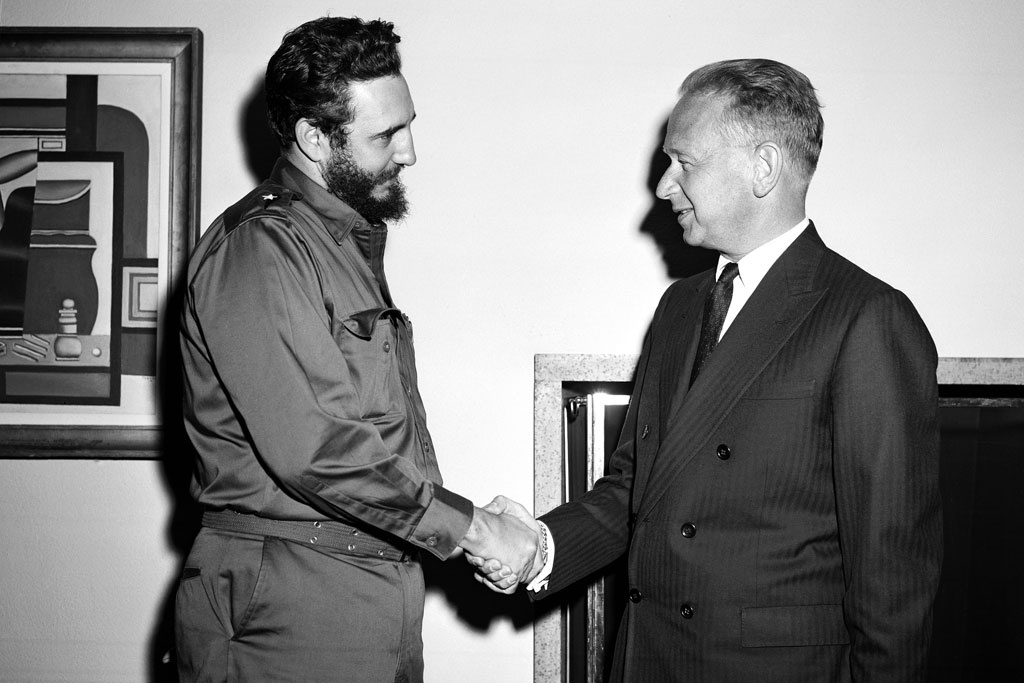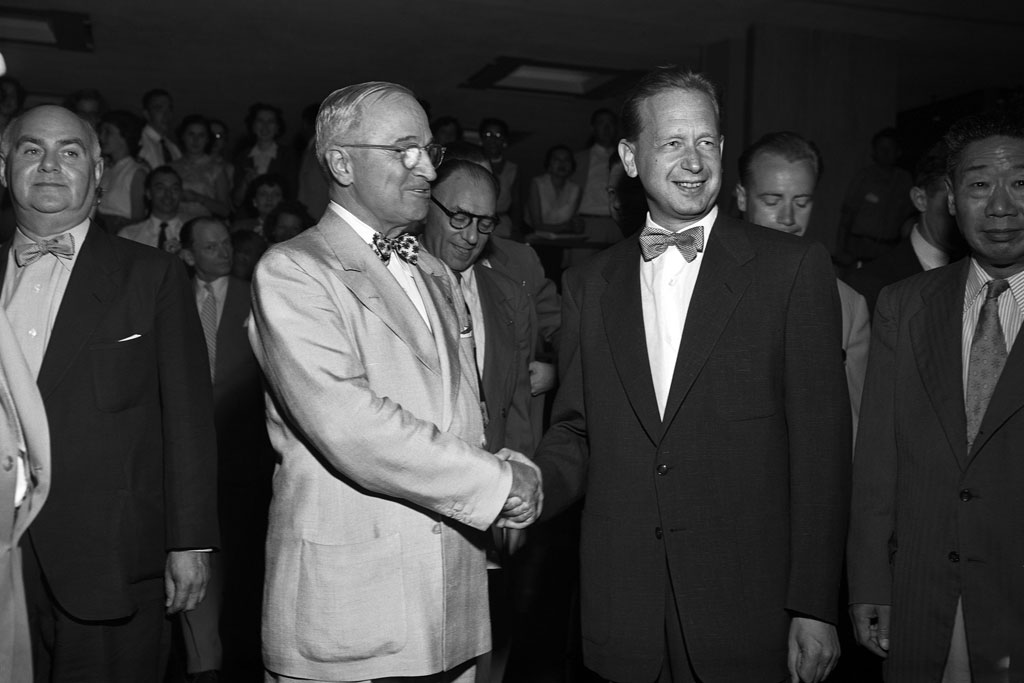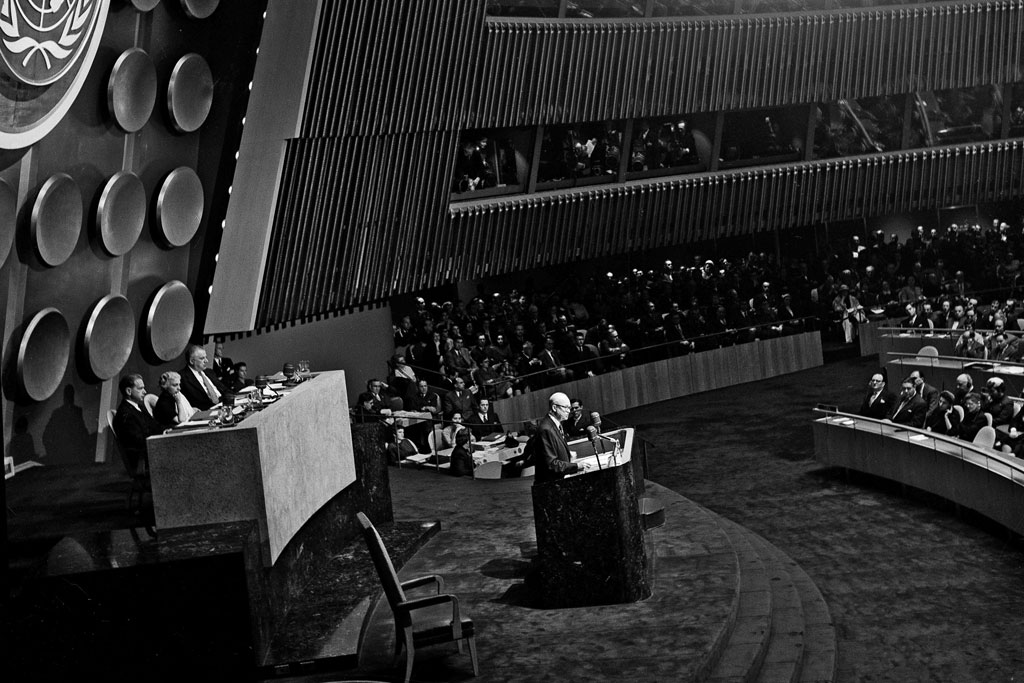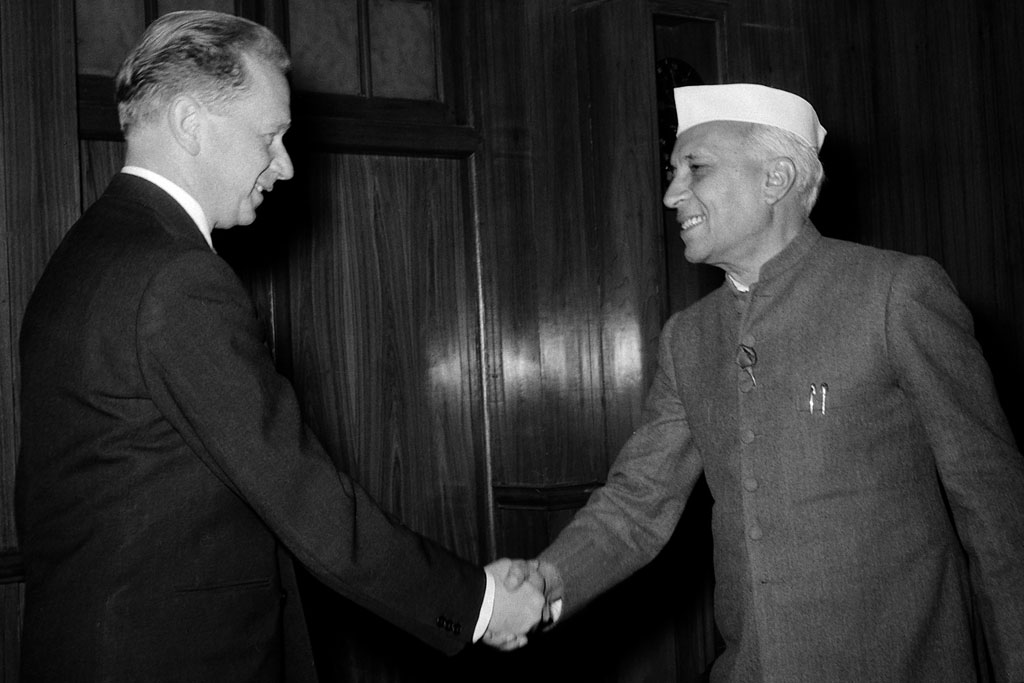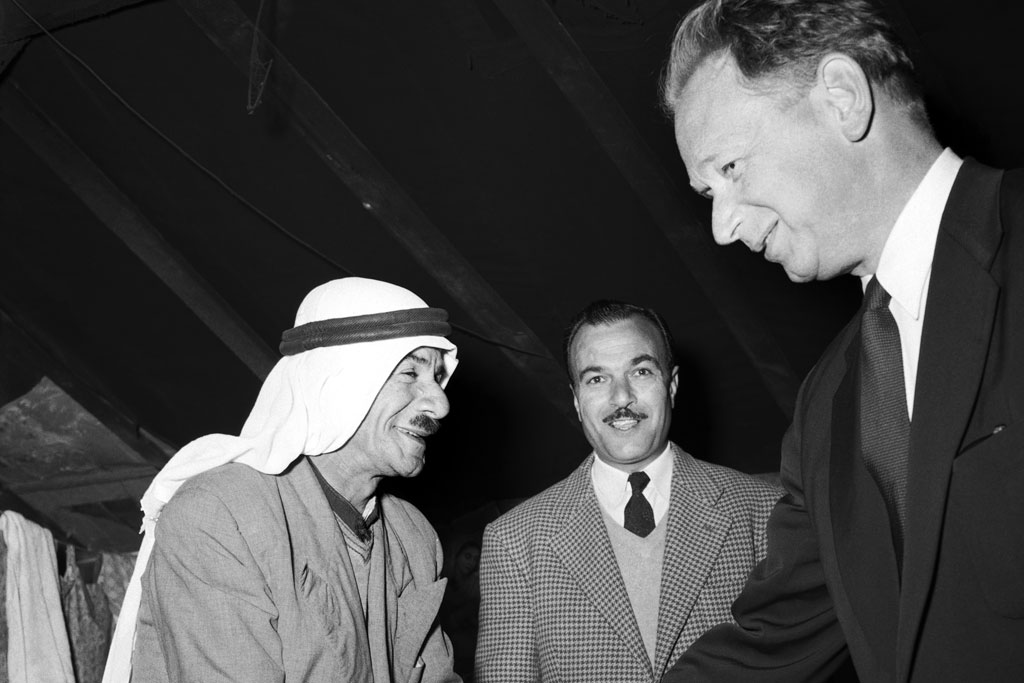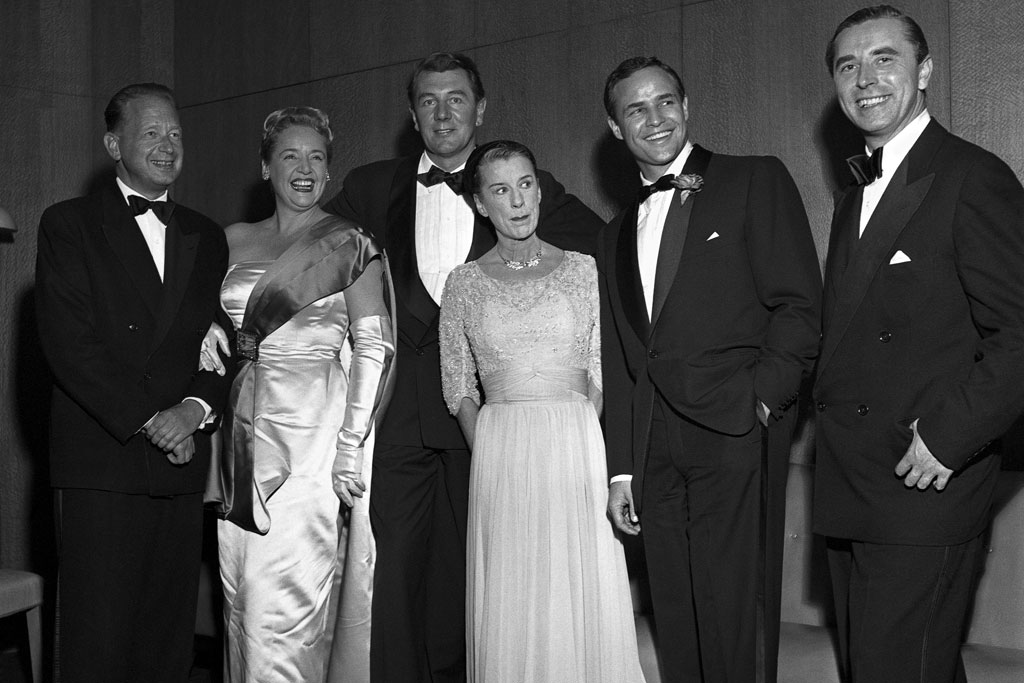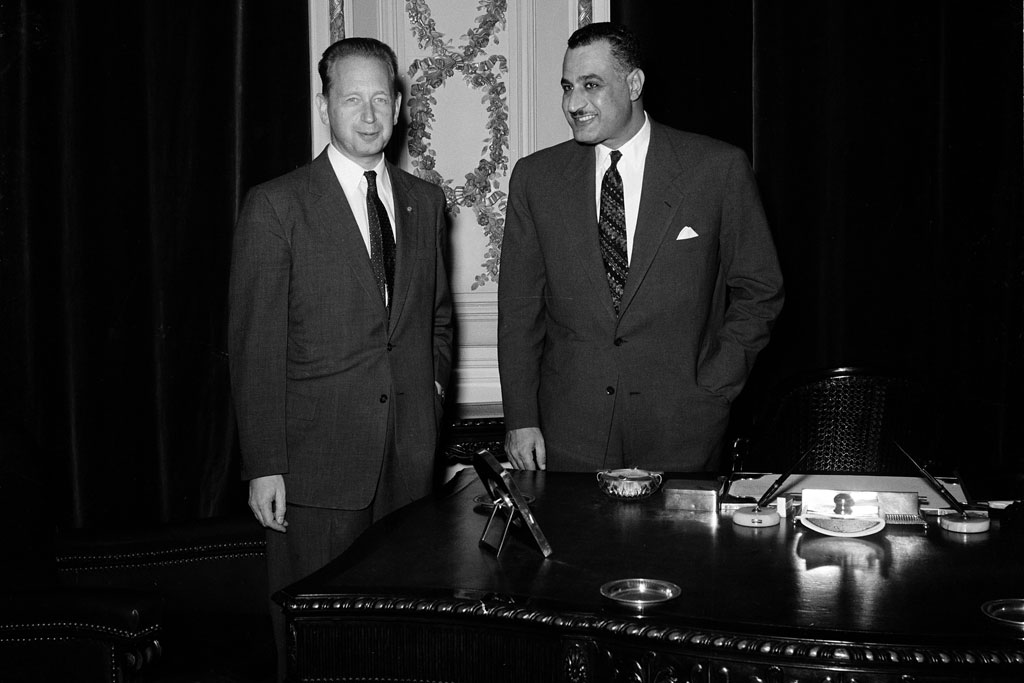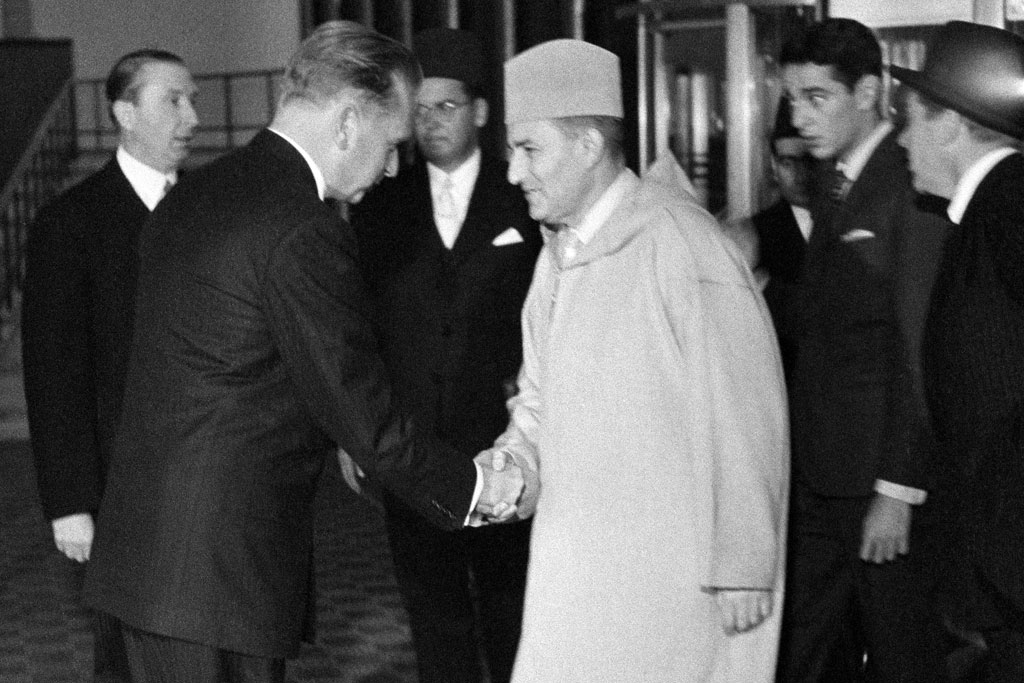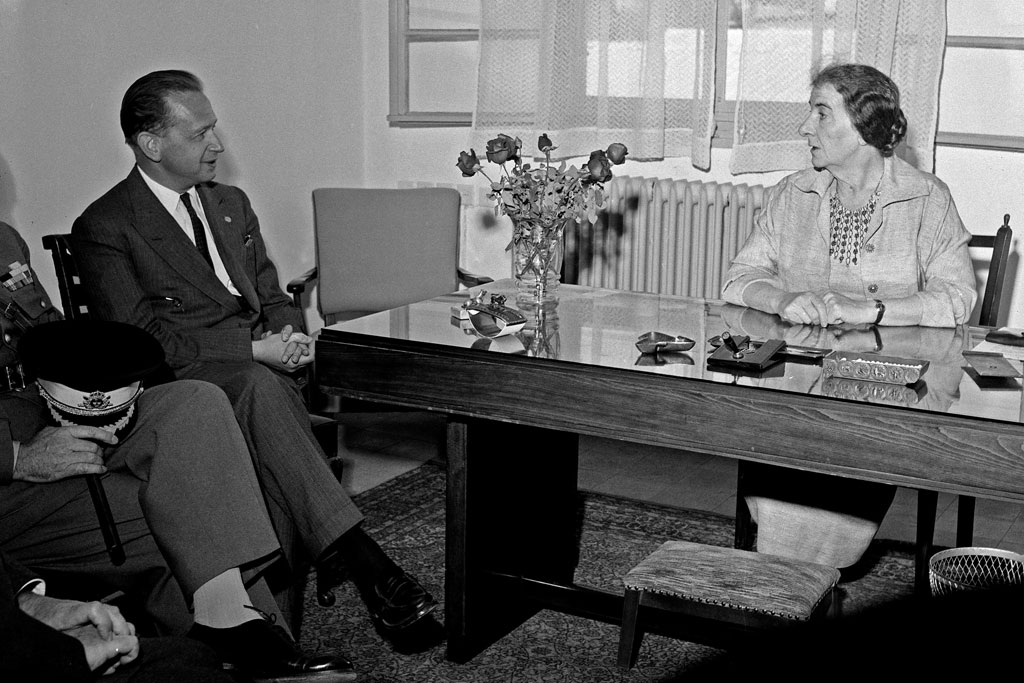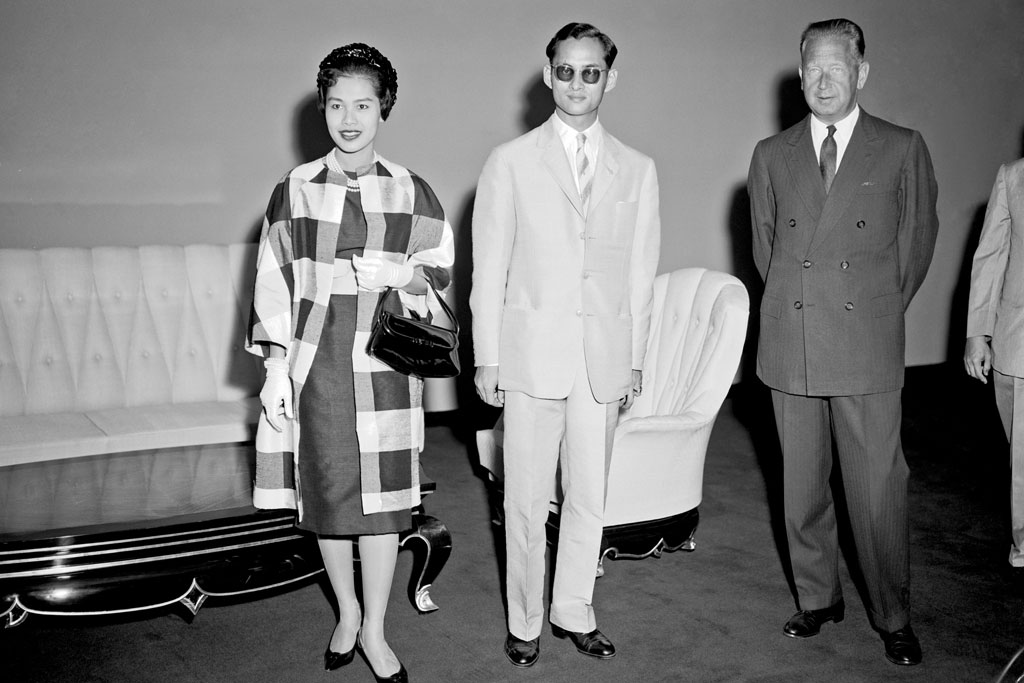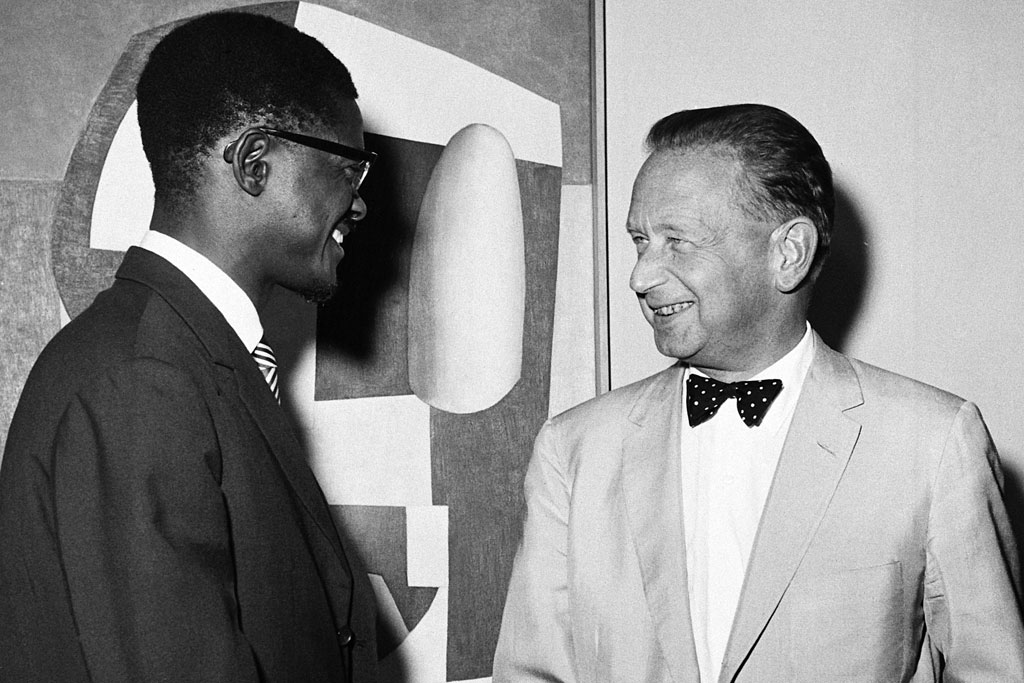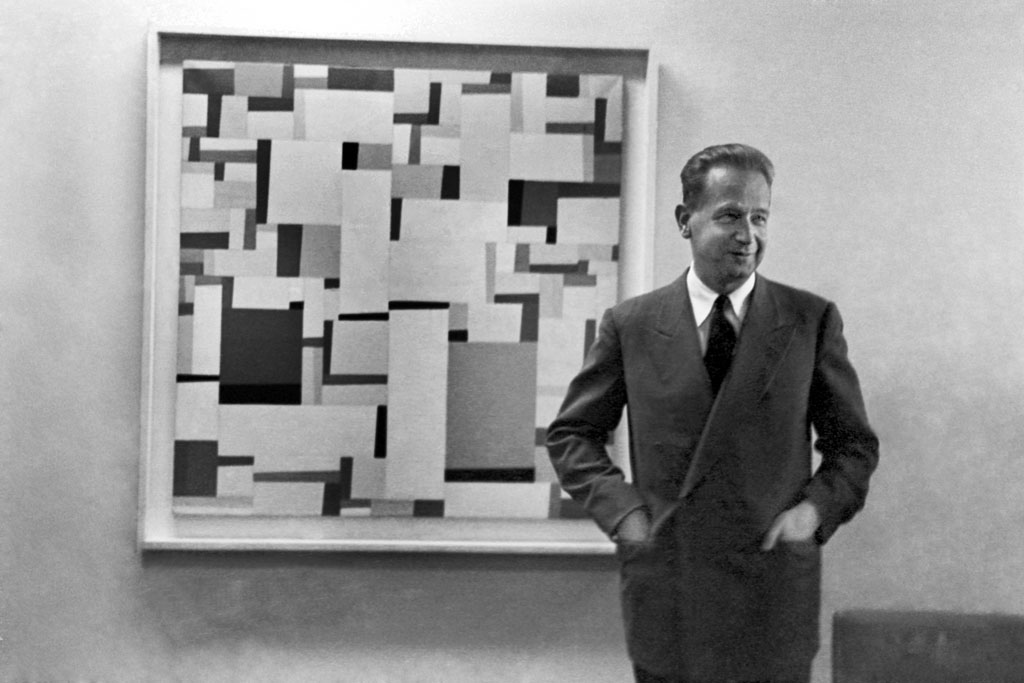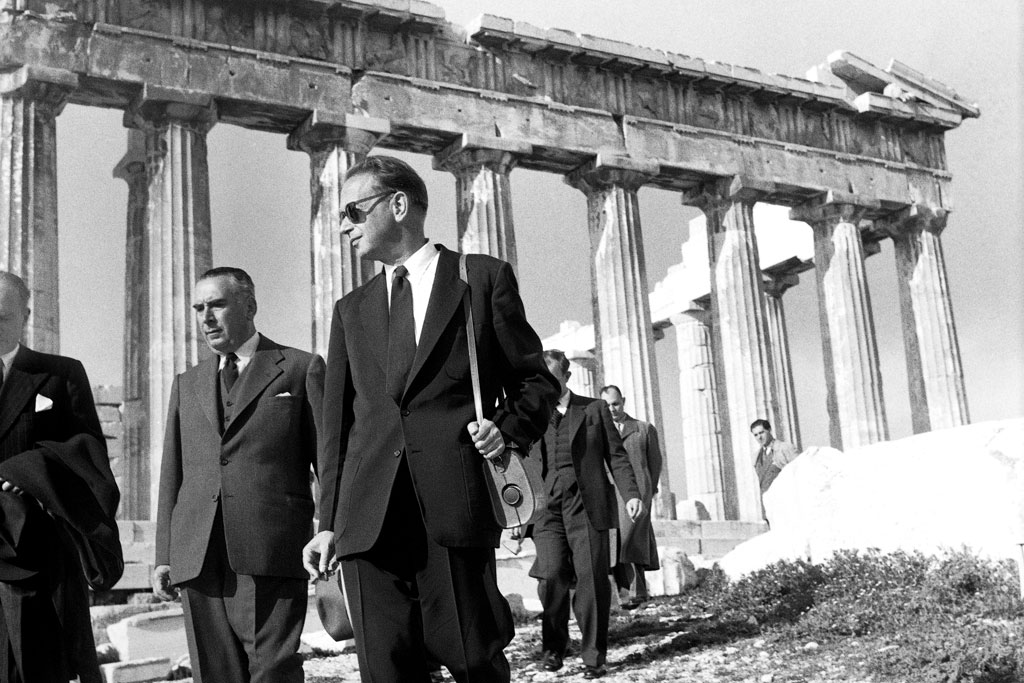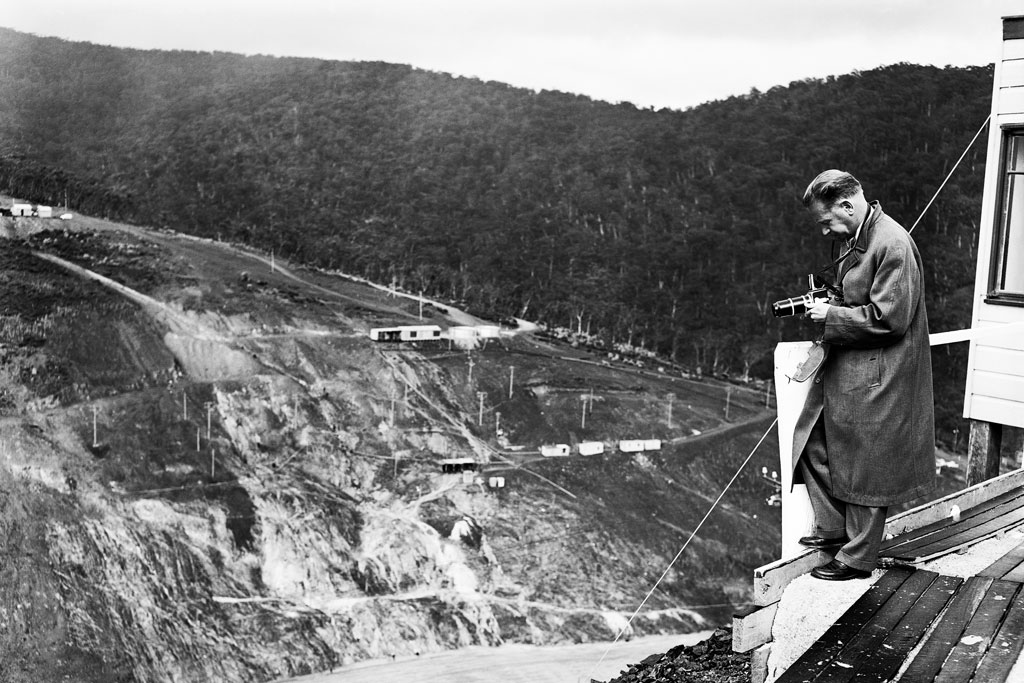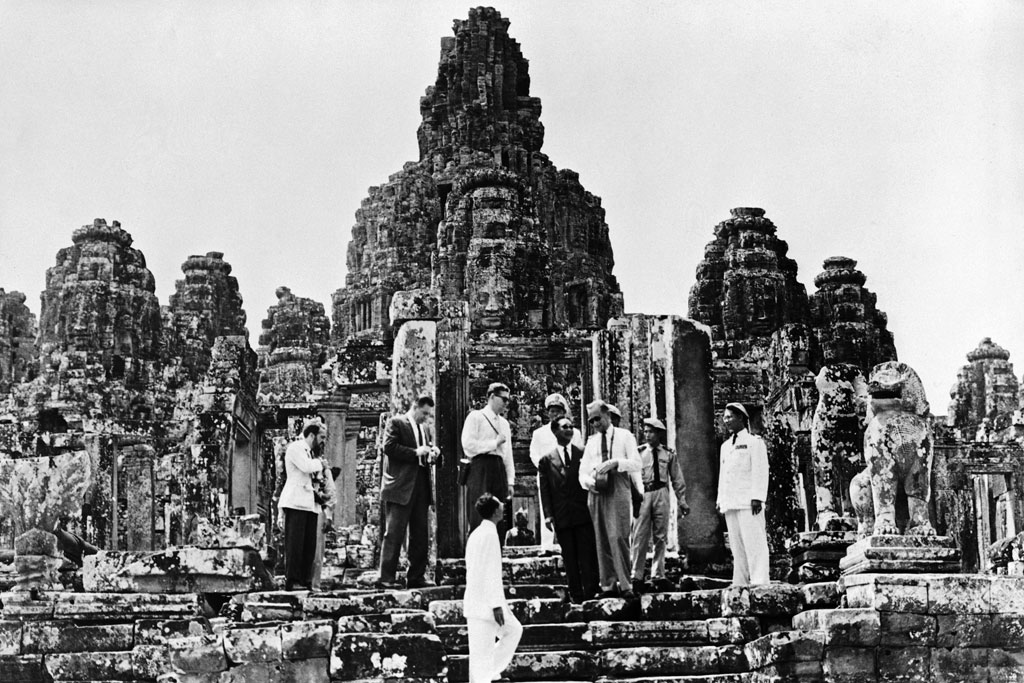Character Sketches: Dag Hammarskjöld by Brian Urquhart

Ralph Bunche, who was usually sparing with praise, once described Dag Hammarskjöld as “the most remarkable man I have ever seen or worked with…” Hammarskjöld was certainly unique. When, in a haiku, he compared himself to a unicorn, he was not so far off the mark. He had been a prodigy since his childhood — an intellectual with an uncommon gift for public administration and practical statesmanship. By the age of thirty he was Under-Secretary of the Swedish Ministry of Finance, serving concurrently as the chairman of the Governors of the Bank of Sweden. Here, he developed the legendary self-discipline and application that later enabled him to master the enormous workload required of an activist Secretary-General of the United Nations.
For all his success as a public servant in Sweden — head of the Foreign Office, Swedish representative in setting up the Organization for European Economic Cooperation and the Council of Europe — in his early years Hammarskjöld seems to have suffered from a nagging sense of lack of fulfillment. The theme of emptiness constantly recurs in the early pages of Markings, his spiritual diary, and with it the search for meaning, reality, a way to “transform the mirror into a doorway.” This search reached its conclusion in 1953 with his 🎧 unexpected election as Secretary-General of the United Nations.
Hammarskjöld ruthlessly protected his privacy and his personal routine. If, on tour in some distant place, he was for an hour or two relaxed, forthcoming and friendly, the mood would quickly pass. Those who tried to claim some special relationship were rebuffed. He often seemed to be indifferent to ordinary human feelings or weaknesses. Perhaps because he lacked experience of close personal relationships, he could make serious misjudgments of character, resulting in appointments that he later regretted. He made no secret of his undoubted intellectual ascendancy and tended to lose interest in those who did not comprehend, and respond to, his practical idealism. He was unforgiving of mistakes or misunderstandings. He had a devastating if quiet temper that sometimes fell on innocent bystanders. He could be shrill in his indignation at those who he believed to be working against him.
Hammarskjöld was not usually a companionable man, but he was certainly an extraordinary one, and we were all prepared —indeed anxious — to serve him without question to the limit of our powers and endurance. When he died in a plane crash in Africa, we grieved for him as for the most intimate of friends because we realized that working with Hammarskjöld was a privilege and an experience that would never come our way again.
Some highlights from the career of Secretary-General Dag Hammarskjöld, the United Nations' second top official who went to one to be awarded a Nobel Peace Prize after his untimely death in 1961. The Nobel Committe awarded him the prize posthumously "in gratitude for all he did, for what he achieved, for what he fought for: to create peace and goodwill among nations and men." Credit: UN News
An intellectual in action is a fine sight. Watching Hammarskjöld tackling international crises had something in common with looking at a masterpiece or hearing a great performance. His honesty and integrity were absolute. Because stringent intellectual discipline enabled him to think through problems in advance, Hammarskjöld was usually several steps ahead of the people he was dealing with. In negotiations he was particularly skillful at breaking an impasse between leaders bogged down in conflict. He had a phenomenal memory, a wide range of learning and an 🎧 extraordinary capacity for marshaling and analyzing facts and trends. On a single Sunday afternoon in August 1961, he dictated to his assistant Hannah Platz his last and most important report to the UN, a document of some 6,000 words setting out his position on the highly controversial issues of the time, without notes and without a pause. He made virtually no corrections to the original draft.
Hammarskjöld always seemed to know exactly what he was doing and where he was going, but it was sometimes not so easy to follow him. Inability to keep up with his esoteric allusions, conceptual subtleties and shorthand explanations inevitably narrowed his trusted circle among both national diplomats and the UN Secretariat. “The surgeon technically most satisfied by last night’s operation,” he cabled Henry Cabot Lodge, the US Ambassador to the UN, from the Middle East during the 1958 Lebanese crisis. “Now he must trust Mother Nature hoping strongly that anxious friends will stay out of the sick room, keep silent and wait until bandages can be taken off.” Lodge appealed to Ralph Bunche for a translation.
Charisma is an inadequate word to explain Hammarskjöld’s public impact. Like some other distinguished Swedes — Greta Garbo comes to mind — he had a pervasive personal mystique which seemed all the stronger for the fact that he was a shy man who had some difficulty in establishing personal relations with others and was often ill-at-ease in the jostle and bonhomie of ordinary life. Nonetheless, in some inexplicable way he entered the imagination of ordinary people all over the world and contrived to convey a simplified but powerful image of what he was trying to do.
Hammarskjöld had great physical as well as intellectual stamina. He rarely did anything he thought unnecessary, never read what he did not wish to read and wasted as little time as possible in activities, social or professional, for which he had no use. I well remember his reception of an account I had written of the UN’s first Conference on the Peaceful Uses of Atomic Energy, an event of which he was particularly proud. The paper came back the same day with the the inscription, “Sorry — no time. But thanks.” His self-discipline was firm. Even in times of crisis, he put aside an hour or two each day for intellectual pursuits: reading for pleasure and as a member of the Swedish Academy committee that awarded the Nobel Prize for literature; translating difficult works — St. John Perse, Djuna Barnes, Martin Buber — from English, French or German into Swedish; and following contemporary developments in art and music. The arts were the true companions of his bachelor life.

31 March 1953 - By a vote of ten to none, with one abstention, the Security Council decided to recommend to the General Assembly the appointment of Dag Hammarskjöld, then serving as a Minister of State for Sweden, as Secretary-General of the United Nations in succession to the Organization’s first top official, Trygve Lie of Norway, who announced his intention to resign in November 1952. Here, in the delegates lobby of the Assembly building at UN Headquarters in New York, the President of the Security Council for the month of March, Ahmed S. Bokhari (centre) of Pakistan, announces the Council's decision to the media.

09 April 1953 – Such secrecy had been maintained throughout the Security Council’s search for a successor to Secretary-General Lie, that even Hammarskjöld was unaware his name had been put forward. UN Member States has considered him an apolitical compromise candidate for the post. He was reportedly stunned when he received the news as he had neither the wish nor the ambition to be UN Secretary-General, but was able to put aside his personal doubts and private concerns and agreed to take on the role. Here, the new UN Secretary-General-designate is greeted by Secretary-General Lie upon landing in New York, ahead of his swearing in. “Welcome, Dag Hammarskjöld, to the most impossible job on this earth,” Lie told his successor.
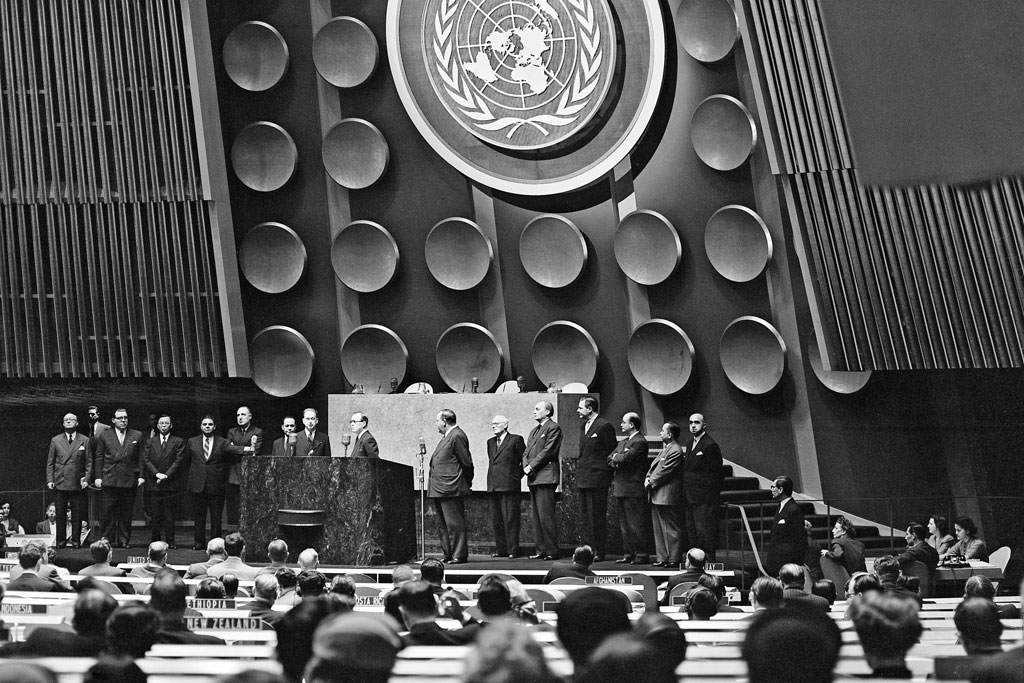
10 April 1953 – In early April 1953, the General Assembly voted by secret ballot, and adopted by 57 votes to one, with one abstention, the recommendation of the Security Council to appoint Dag Hammarskjöld as the second UN Secretary-General. Here, Assembly President Lester. B. Pearson (centre) of Canada administers the oath of office to Hammarskjöld (left) as out-going Secretary-General Lie (right) looks on.

24 October 1953 – Here, Secretary-General Hammarskjöld addresses an outdoor celebration in commemoration of United Nations Day at UN Headquarters in New York. The outdoor ramps of the General Assembly building served as a stage, with the Assembly building itself serving as a backdrop. In a speech to UN staff some months earlier, he had said, “....whatever action I take will be taken always with the interest of the United Nations and its staff solely in view, on the basis of as full and objective information as I can get, in accordance with the best of my judgment and in complete independence of influences from outside - or from inside - the Organization".
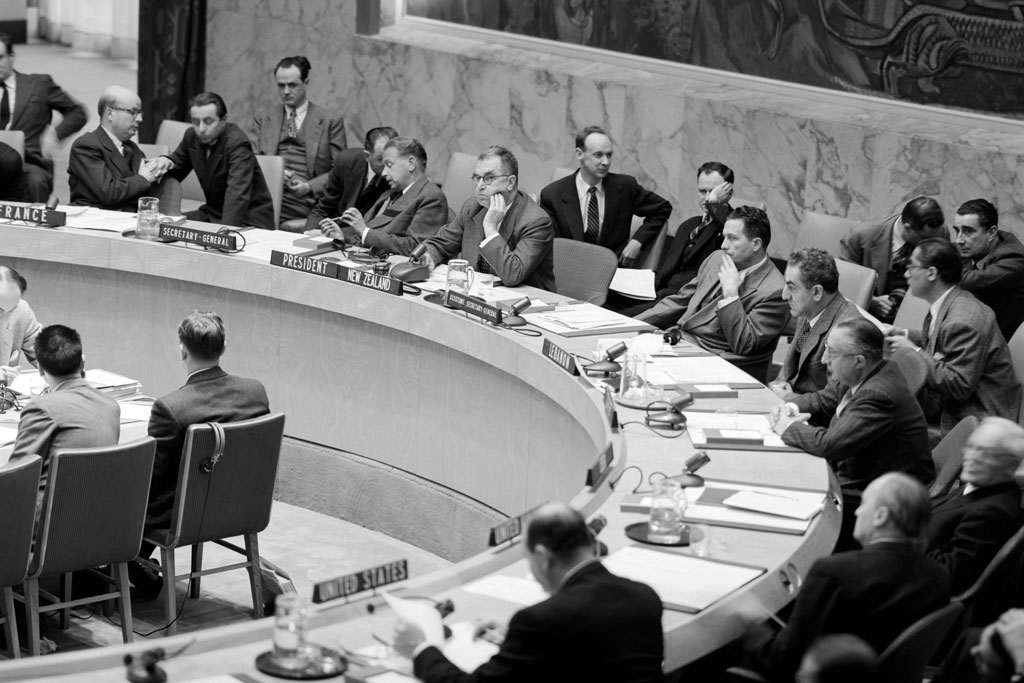
21 January 1954 – Developments in the Middle East were a top agenda item for the Security Council in the 1950s. Here, the Council, with Secretary-General Hammarskjöld present (second from left at the Council table), resumes consideration of a Syrian complaint against Israel concerning the work on the West Bank of the Jordan River in the Demilitarized Zone. Also present is the UK Permanent Representative to the UN, Sir Gladwyn Jebb (second from right at the Council table), who had served as acting Secretary-General during the creation of the UN.
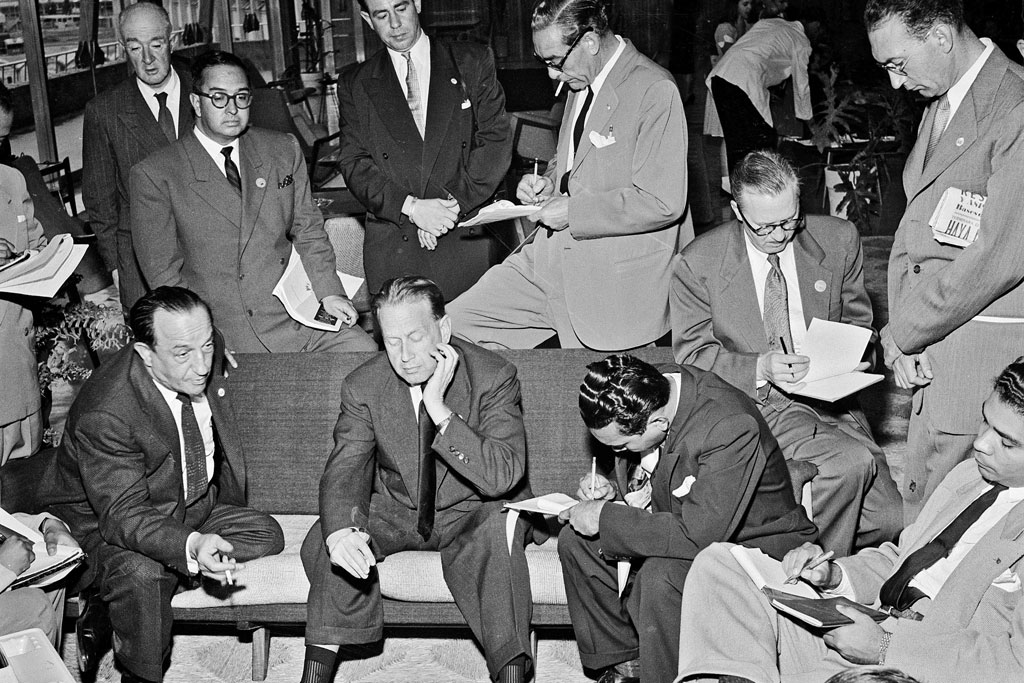
03 March 1954 – Secretary-General Hammarskjöld recognized the important role of the media in communicating the work of the United Nations, and frequently briefed journalists. Here, he holds an impromptu press conference in the Venezuelan capital of Caracas, shortly after delivering an address to the inaugural meeting of the Tenth Conference of American States in that city.

30 December 1954 – The General Assembly requested that Secretary-General Hammarskjöld try to secure the release of UN Command personnel detained against their will by the Chinese People's Republic, including eleven US airmen sentenced to prison term on espionage charges. The UN Command was the command structure set up for the operation of international military forces fighting with the Republic of Korea. Pledging to “do my best” to discharge the task, the UN chief is seen here escorted to a New York airport by a number of UN officials and Member State representatives on his way to the Chinese capital, Beijing, then known as Peking.
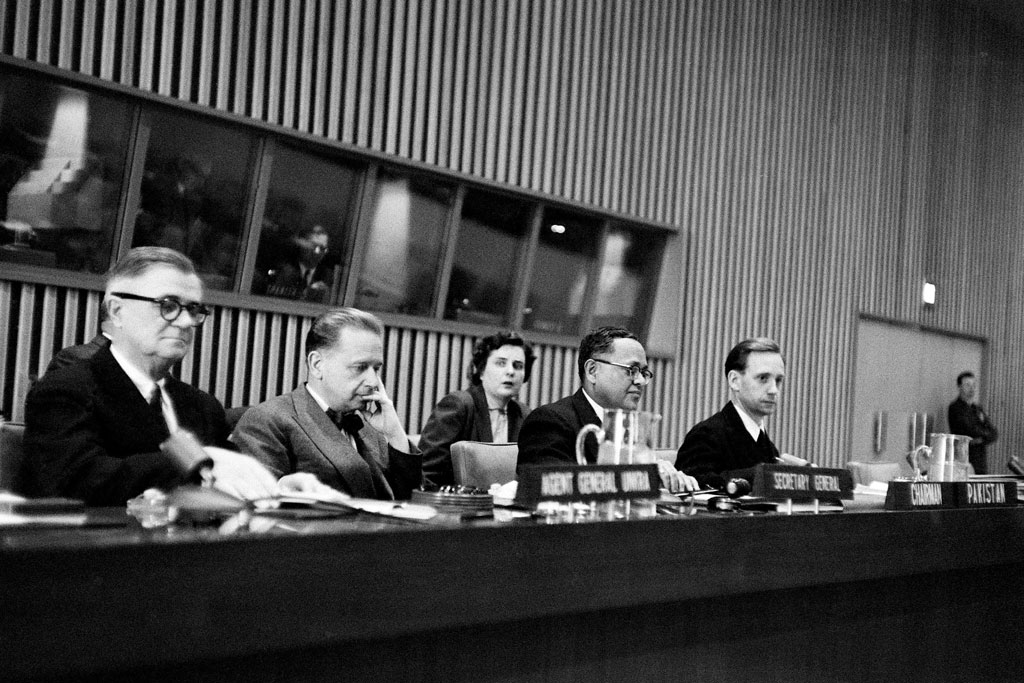
15 February 1955 – The UN Korean Reconstruction Agency (UNKRA) was facing a “perilous” financial situation. UNKRA was created by the General Assembly in 1951 and its efforts were focussed on industry, mining, agriculture, education, housing and health in order to improve the economy and promote Korea's long-term growth. Here, the General Assembly's Negotiating Committee for Extra-Budgetary Funds meets on the matter, with Secretary-General Hammarskjöld and others present, including Brian Urquhart, who served as Committee Secretary.

12 April 1955 – “Hammarskjöld was not usually a companionable man, but he was certainly an extraordinary one, and we were all prepared – indeed anxious – to serve him without question to the limit of our powers and endurance,” Brian Urquhart wrote of Secretary-General Hammarskjöld. Seen here, the UN chief confers with officials from his Executive Office, including Urquhart (seated at right), who was also Secretary of the forthcoming International Conference on the Peaceful Uses of Atomic Energy.

25 June 1955 – Secretary-General Hammarskjöld suggested that, in trying to settle world problems, UN Member States should make greater use in the future of “quiet diplomacy” within the framework of the United Nations. As the same time he advocated efforts to strengthen the role of the International Court of Justice in the international constitutional system. He made these points in remarks he delivered to a special convocation at the University of California’s Greek Theater in Berkeley, in honour of the UN’s tenth anniversary.
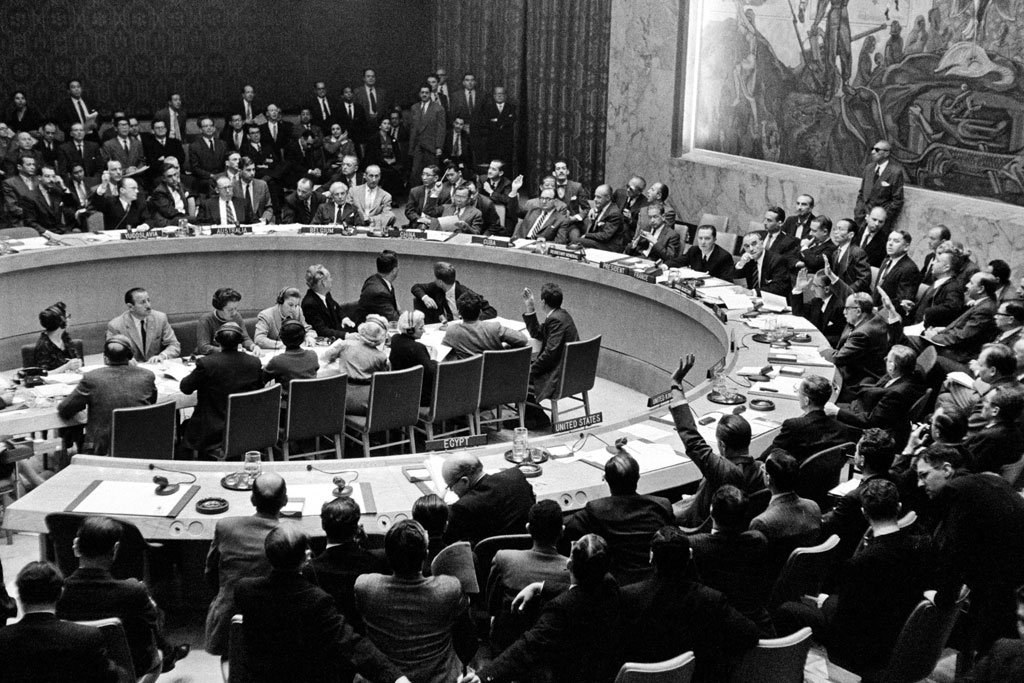
01 November 1956 – Here, Secretary-General Hammarskjöld attends a Security Council meeting at which it adopted a Yugoslav resolution to call an emergency special session of the General Assembly to solve the Middle East crisis, as provided for by the "Uniting for Peace" resolution of the Assembly. Under that resolution, adopted in 1950, an "emergency special session" can be convened within 24 hours if the Security Council, because of lack of unanimity of the permanent members, fails to exercise its primary responsibility for the maintenance of international peace and security in any case where there appears to be a threat to or breach of the peace. Under it, the Assembly can consider the matter immediately with a view to making appropriate recommendations.

17 November 1956 – Secretary-General Hammarskjöld was in Egypt to discuss with the Egyptian Government questions concerning the presence and functioning of the UN Emergency Force (UNEF), which was established to secure and supervise the cessation of hostilities, including the withdrawal of the armed forces of France, Israel and the United Kingdom from Egyptian territory and, after the withdrawal, to serve as a buffer between the Egyptian and Israeli forces. Here, he reviews a contingent of Danish and Norwegian troops of UNEF upon his arrival at Abu Suweir airport.
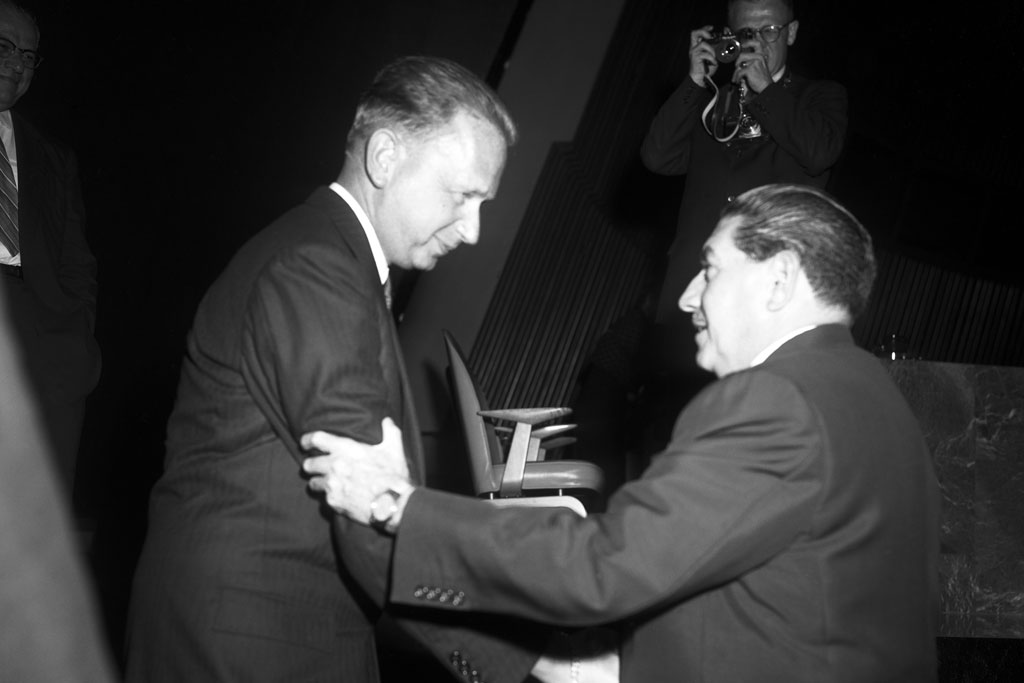
26 September 1957 – Hammarskjöld’s first term as Secretary-General was due to expire on 10 April 1958. He was unanimously re-elected to a second five-year term some seven months before then, following a unanimous recommendation of the Security Council to the General Assembly. Here, the UN chief is congratulated shortly after his re-election, by Dr. Luis Padilla Nervo, Mexico’s Secretary for External Relations, and Chairman of his country’s delegation to the 12th session of the General Assembly.

10 April 1958 – New York City has played host to the UN since its early days, with the Organization's headquarters eventually located there. Here, on the first day of his second term, Secretary-General Hammarskjöld (back of car, at right) leaves UN Headquarters on the way to the luncheon at Waldorf-Astoria Hotel, in a motorcade bearing the flags of the United States, the United Nations, New York State and New York City. Seated next to him is Richard C. Patterson, Jr., Commissioner of the Department of Commerce and Public Events.

December 1958 – Secretary-General Hammarskjöld spent Christmas of 1958 in the Middle East with peacekeepers serving with the UN Emergency Force (UNEF). Here, he is shown at an observation post, part of his visit of the company headquarters and several other observation posts along the Armistice Demarcation Line manned by troops serving with UNEF’s Indian contingent.

28 December 1958 – There are five UN regional commissions around the world, and they serve as UN outposts in their respective regions. They share key objectives aiming to foster economic integration at the subregional and regional levels, to promote the regional implementation of internationally agreed development goals, and to support regional sustainable development. Here, Secretary-General Hammarskjöld arrives at Addis Ababa for the opening of the first session of the new UN Economic Commission for Africa (ECA). The Commission continues to provide a focal point where the economic needs of African people can be expressed and where action to meet them can be initiated and stimulated.
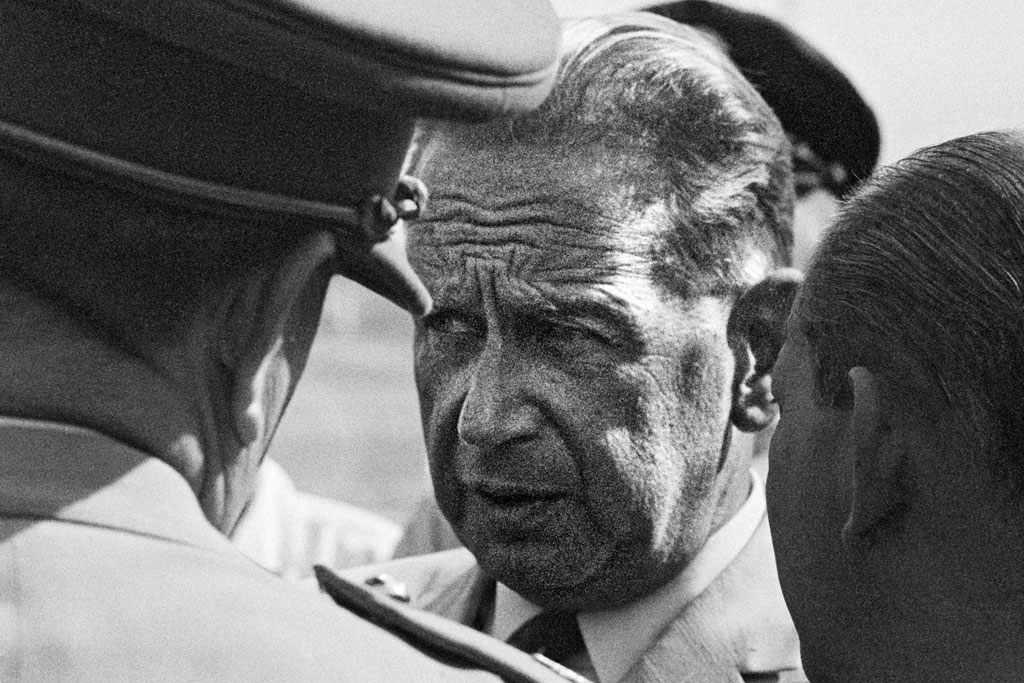
14 August 1960 – The Republic of the Congo (now known as the Democratic Republic of the Congo) became independent in May 1960, after many decades as a Belgian colony. Soon after independence, it experienced political upheaval, a secessionist movement and civil war. Here, Secretary-General Hammarskjöld confers with colleagues at the airport at Elisabethville (now known as Lubumbashi) after having held talks with authorities from the breakaway province of Katanga and Belgian representatives concerning the modalities of the withdrawal of Belgian troops and the deployment of UN peacekeepers.

10 September 1960 – Secretary General Hammarskjöld briefed the Security Council regularly on his efforts in relation to the Republic of the Congo, as shown here. After its meeting – at which it discussed the UN chief’s fourth report on the situation in the Congo and a Yugoslav request for consideration of the situation there – the President of the Council appealed to all to refrain from action that might aggravate danger in the African country.
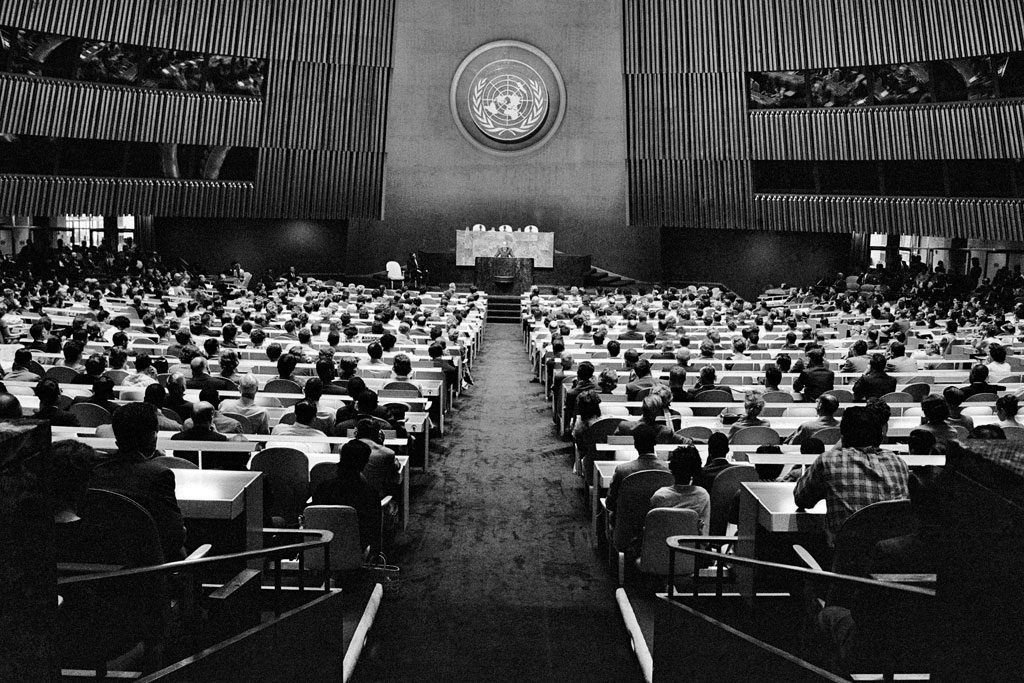
08 September 1961 – Secretary-General Hammarskjöld recognised the importance of staff in achieving the UN's goals. "In a situation like the one now facing all peoples of the world, as represented in this Organization, it is understandable that staff members should sometimes feel frustrated and even depressed. In that they are not different from their fellow beings in other positions influenced by the trend of world events. There is only one answer to the human problem involved, and that is for all to maintain their professional pride, their sense of purpose, and their confidence in the higher destiny of the Organization itself, by keeping to the highest standards of personal integrity in their conduct as international civil servants and in the quality of the work that they turn out on behalf of the Organization. This is the way to defend what they believe in and to strengthen this Organization as an instrument of peace for which they wish to work. Dejection and despair lead to defeatism - and defeat," he told staff at this meeting held in the General Assembly Hall. It was to be his last encounter with them.
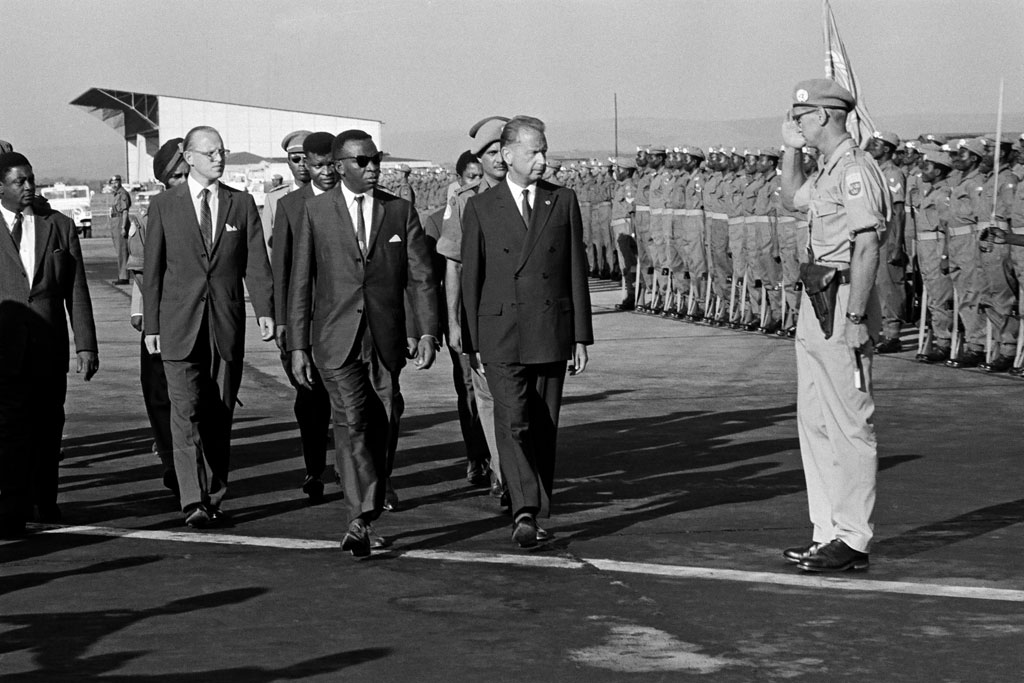
13 September 1961 – The issue of the Republic of the Congo continued to dominate international affairs in 1961, including the attention of Secretary-General Hammarskjöld. Here, he inspects a guard of honour made up of UN peacekeepers shortly after arriving in the capital, Leopoldville (now known as Kinshasa). He had come in response to an invitation by Premier Cyrille Adoula to discuss UN aid and support for the country.
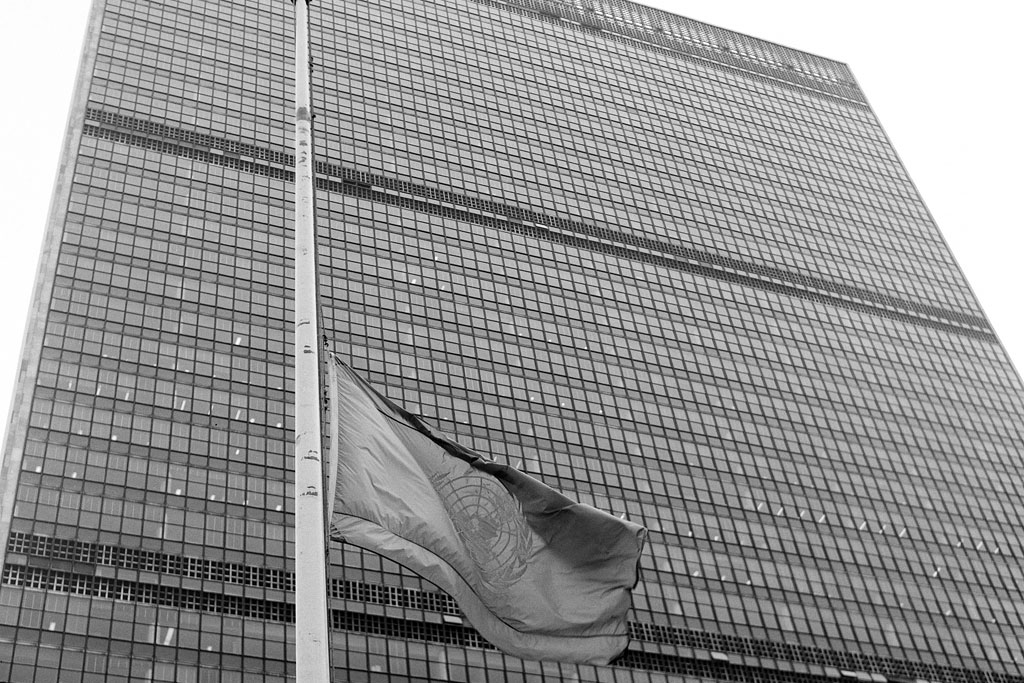
18 September 1961 – In addition to discussing future prospects for the UN peacekeeping force in the Republic of Congo, Secretary-Hammarksjold also sought to bring about a reconciliation between the Congolese government and the breakaway province of Katanga. However, confronted with a situation of confused fighting in Katanga, he devoted himself to the task of securing a cessation of the hostilities and achieving reconciliation among Congolese factions. In a quest for a cease-fire, he flew to Ndola (in what was then Northern Rhodesia) to meet the provincial president of Katanga, Moshe Tshombé. On this flight, on the night of 17 September, his aeroplane crashed and he was killed, together with seven other UN staff members, and the Swedish crew. Here, the UN flag at UN Headquarters in New York flies at half-mast following the confirmation of his death.

28 September 1961 – A memorial ceremony for the late Secretary-General Hammarskjöld, and those who died with him, was held in the General Assembly Hall at UN Headquarters in New York. Here, those attending the ceremony stand for a minute of silence in tribute.

29 September 1961 – Secretary-General Hammarskjöld was buried in the Swedish city of Uppsala, where he was raised. Here, the coffin carrying his body arrives at the cemetery of Uppsala, followed by dignitaries from many countries.
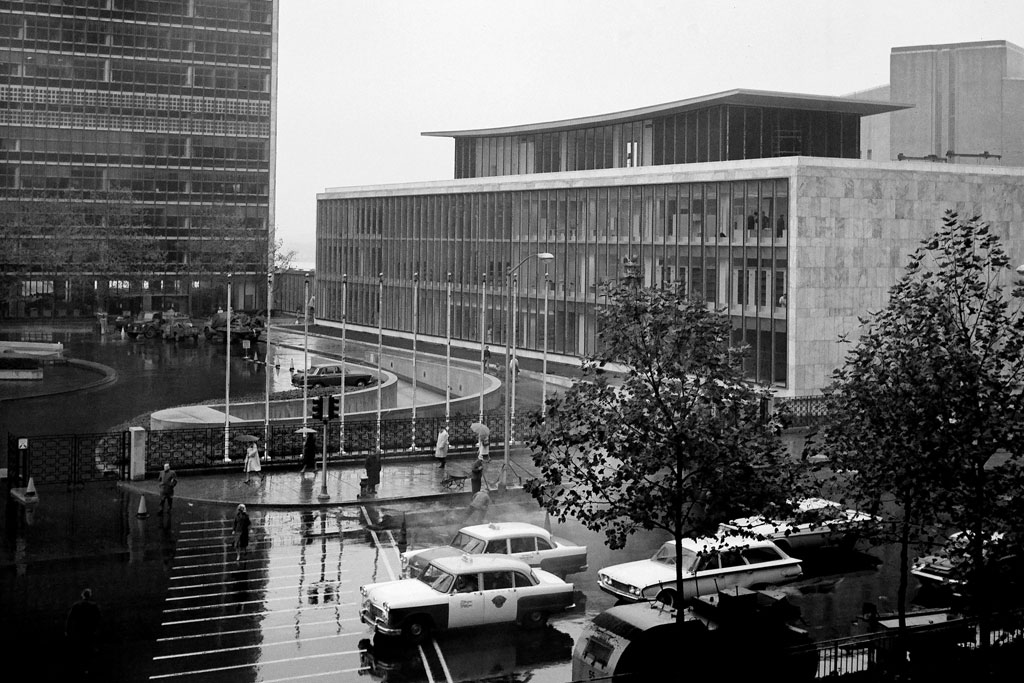
15 November 1961 – Following Secretary-General Hammarskjöld's death, there were many monuments to his memory and legacy. Among them was the library at UN Headquarters, which was dedicated to his memory on 16 November. Designed by the firm of Harrison, Abramowitz and Harris, architectural consultants to the United Nations, the new library building is constructed in white marble, glass and aluminum. It has six stories and a penthouse, three of the floors lying above ground and three below.

20 January 1962 – Secretary-General Hammarskjöld's efforts in the Republic of the Congo were not forgotten locally. Here, hundreds of philatelists stand in line at the central post office in the capital to purchase the “Dag Hammarskjöld memorial stamp.” Two hours after sales began, no more complete series were available. Issued by the Republic of the Congo in eight denominations, the stamps showed the late Hammarskjöld looking at a map of Africa with the Congo in relief. Underneath was inscribed “Republique du Congo hommage a Dag Hammarskjöld.”
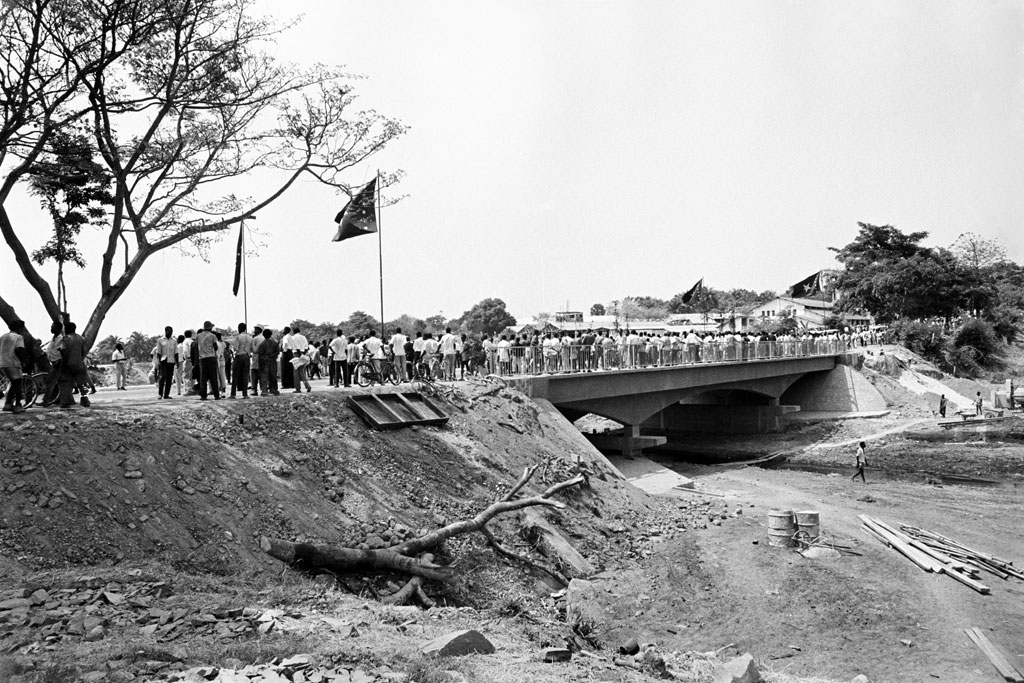
17 September 1962 – The Republic of the Congo also named a bridge after the late Secretary-General. Shown here is the opening of the Dag Hamarskjöld Bridge in the capital. The bridge, situated on Avenue Engles, was a continuation of the city's main roadway, the Blvd. Albert, and is considered of major importance to Leopoldville province as it connects the area where the provincial administration and services are located with the rest of the city. This bridge was the first major construction work completed in the Congo with UN aid.

17 September 1962 – At UN Headquarters, in addition to the library, a bronze plaque in memory of the late Secretary-General Hammarskjöld and those who died with him, was mounted on the wall outside the Meditation Room in the public lobby of the General Assembly Building. It can still be seen there today.

11 September 1964 – The UN Staff Council raised funds from employees and asked French artist Marc Chagall to contribute to the memory of Dag Hammarskjöld and to all those who had lost their lives in the cause of peace. The monument decided upon was a free-standing piece of stained glass in the south-east wing of the staff lounge on the ground floor of the Secretariat building. The panel depicts conceptions of the artist on the themes of peace and man – and can still be seen there. Here, Marc Chagall (left) discusses his art work with U Thant of Burma, who succeeded Hammarskjöld as Secretary-General.

11 June 1964 – Also at UN Headquarters, Jacob Blaustein, a former US delegate to the UN and a personal friend of Secretary-General Hammarskjöld, gifted a statue in his memory. Here, the 6.4 metre-high bronze abstract sculpture entitled “Single Form,” sculpted by artist Barbara Hepworth, is unveiled at a ceremony presided over by Secretary-General U Thant.
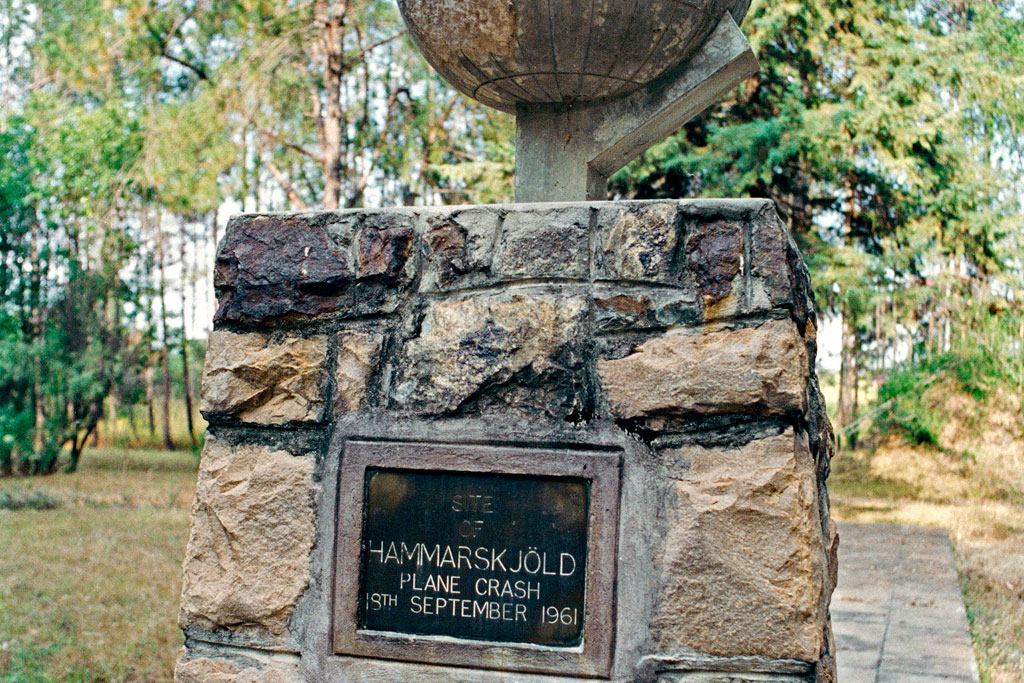
01 May 1991 – At Ndola in Zambia (then Northern Rhodesia), at the site of the plane crash which killed Secretary-General Hammarskjöld, there is now a memorial to him, in addition to the surrounding area being designated as a special park. Part of the memorial includes an inscription including a quotation from him as an epitaph: “The only value of life is its content – for others. Apart from any value it may have for others, my life is worse than death. Therefore, in my great loneliness, serve others.”

11 August 1997 – Even decades later, the legacy of Dag Hammarskjöld remained vivid for his successors. Here, as part of an official visit to Sweden, Secretary-General Kofi Annan lays a wreath and reflects on his life before the grave of one of his predecessors.
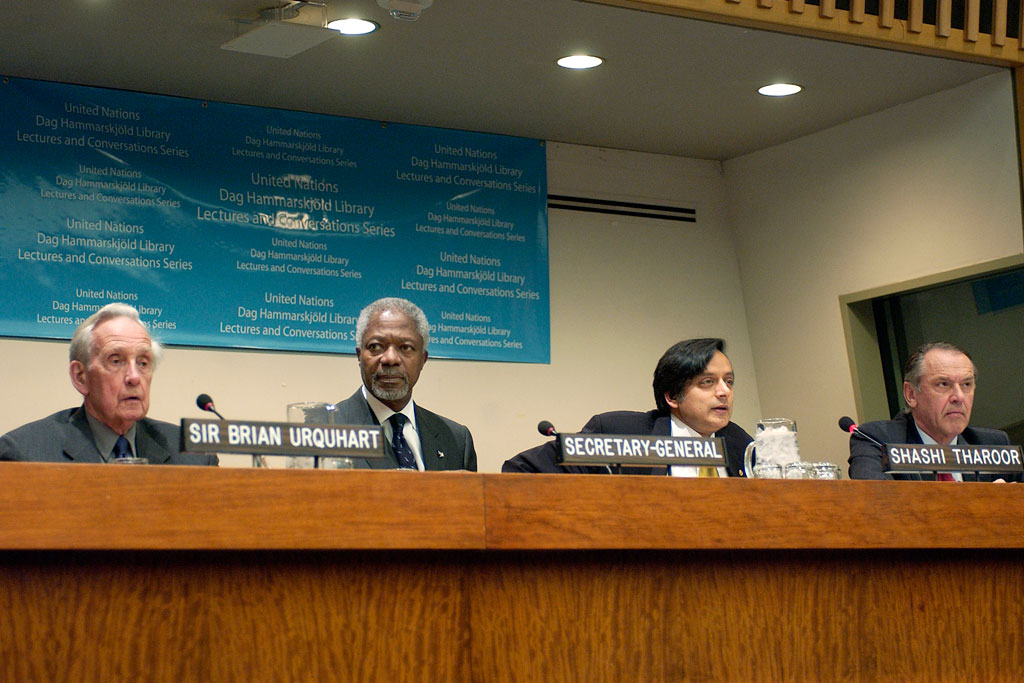
04 April 2005 – On the 100th anniversary of Dag Hammarskjöld’s birth, the United Nations held a series of lectures to mark the occasion, entitled "Dag Hammarskjöld's Legacy and its Relevance to the UN Today." Shown here are panellists taking questions from the audience, including former Under-Secretary-General for Political Affairs and close associate of Hammarskjöld, Brian Urquhart; Secretary-General Kofi Annan; the Under-Secretary-General for Public Information, Shashi Tharoor; and Sweden's Ambassador to the UN, Jan Eliasson.

01 October 2009 – Secretary-General Ban Ki-moon gave a speech at Uppsala University, where Dag Hammarskjöld received his education. Citing the challenges coming at the world, the Secretary-General noted, "If ever there were a time to act in a spirit of renewed multilateralism - a moment to create a United Nations of genuine collective action - it is now." That same day, Secretary-General Ban laid a wreath at the grave of Hammarskjöld. He did so again while on another visit to Uppsala in 2011.
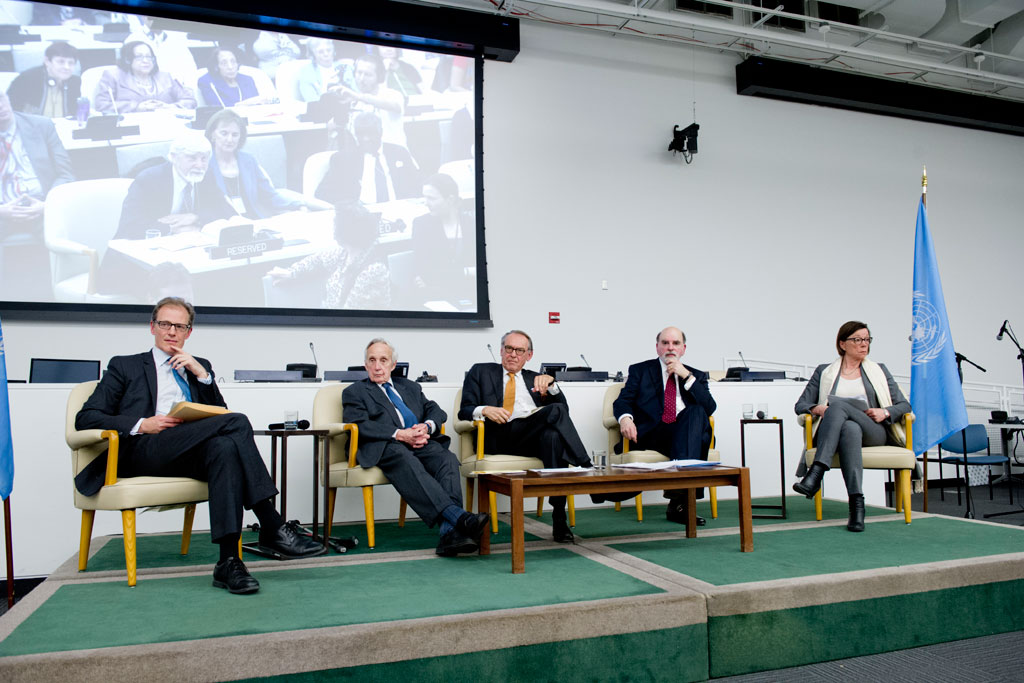
10 April 2013 – On the 60th anniversary of Dag Hammarskjöld’s installation as the second UN Secretary-General, a commemoration event was held at UN Headquarters. Shown here are panellists taking question from the audiences, including the Director of the Political, Peacekeeping, Humanitarian, and Human Rights Unit in the Executive Office of the Secretary-General, Andrew Gilmour; former Under-Secretary-General for Political Affairs and close associate of Hammarskjöld, Brian Urquhart; Deputy Secretary-General Jan Eliasson; the author of a biography of Dag Hammarskjöld, Roger Lipsey; and the then-Executive Director of the Dag Hammarskjöld Foundation, Annika Söder.
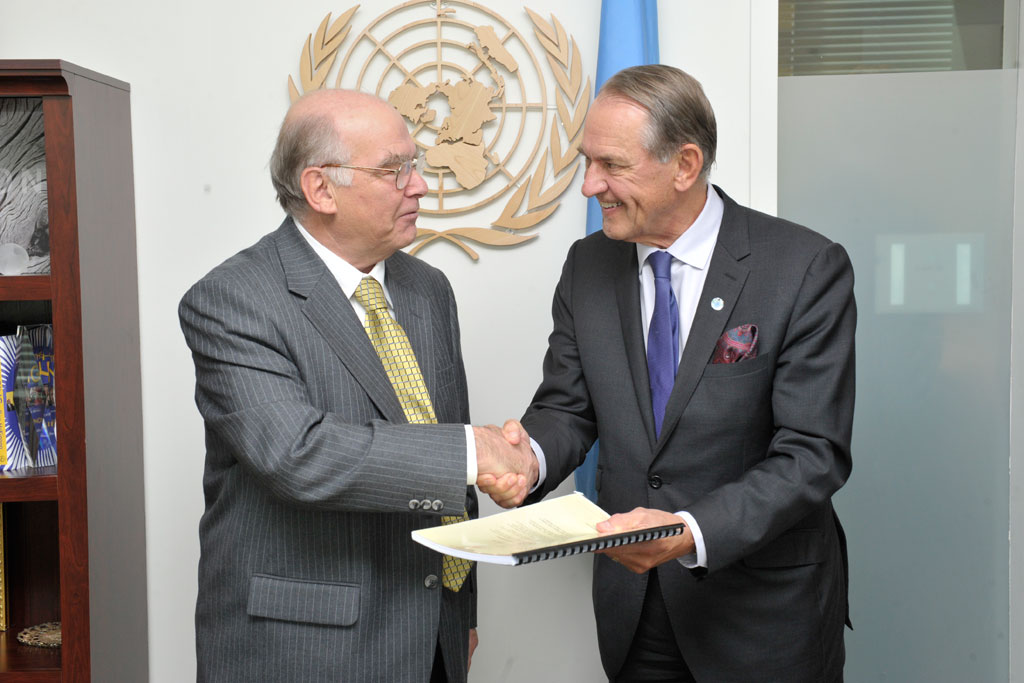
03 October 2013 – Questions have remained surrounding the circumstances of Dag Hammarskjöld’s death. The UN held an inquiry into the crash in 1962 and it returned an open verdict, followed by a General Assembly resolution which requests the Secretary-General to inform it of "any new evidence which may come to his attention." In 2012, the Dag Hammarskjöld Inquiry Trust was established to raise and administer funds to support the independent work of the Hammarskjöld Commission of Inquiry on whether the evidence now available would justify the United Nations in reopening its inquiry into his death. The Commission issued its report in The Hague in September 2013. Here, Deputy Secretary-General Jan Eliasson (right) meets with Lord Lea of Crondall, the Trust’s Chairman.

29 May 2014 – In 2000, the UN established the Dag Hammarskjöld Medal for posthumous award to members of UN peacekeeping operations who lost their lives while serving the cause of peace. Here, the Under-Secretary-General for Peacekeeping Operations, Hervé Ladsous, hands over a medal at a ceremony at which more than 100 military, police and civilian personnel who lost their lives in 2013 while serving in UN peacekeeping operations were awarded the medal posthumously.
The allegations of homosexuality put about by his predecessor Trygve Lie, and regurgitated from time to time by those who disliked or resented him, had no foundation. “Because it did not find a mate/ They called/The unicorn perverted,” Hammarskjöld wrote in a haiku. He seemed to be asexual, admittedly a rare condition, and he obviously could not imagine sharing his life with another person. He told his friend, the Swedish painter Bo Beskow, that he envied the family life of some of his friends but realized that it was not for him. In Markings, he hints more than once at the perils of narcissism, of “mirroring yourself in an obituary.” He was wary of publicity and worried about the distorting effect of public success. “We have to gain a self-assurance,” he wrote, “in which we give all criticism due weight and are humble before praise.”
For all his apparent self-sufficiency, there can be little doubt that Hammarskjöld was often a lonely man. He certainly regarded his all-consuming job as UN Secretary-General as a priceless gift and dreaded its coming to an end. In his last years, he fell back more and more on a fatalistic personal mysticism that allowed him to see himself as the bearer of the message and guardian of the flame of the United Nations Charter, and sometimes as a martyr — even a human sacrifice — in the cause of international peace.
Although I worked with Hammarskjöld for eight years, I was never close to him, and it was not until his 🎧 sudden death that I realized the extent of his hold over my loyalty and imagination. When I went through his papers with his friend, the Swedish diplomat Per Lind, I began to perceive more clearly the extraordinary character, intellect, and sense of mission that lay behind his achievements as Secretary- General.
More than anyone else before or since, Hammarskjöld put the United Nations on the map as a vital guardian of the peace. He made it a potential force in its own right, especially in times of crisis — something that deeply disturbed hard-line nationalists like Nikita Khrushchev or Charles de Gaulle. He bequeathed to his successors an informal guide for tackling critical international problems. In 2001, speaking in Hammarskjöld’s hometown, Uppsala, the seventh Secretary-General, Kofi Annan, put it this way. “There can be no better rule of thumb for a Secretary-General, as he approaches each new challenge or crisis, than to ask himself, ‘How would Hammarskjöld have handled this?'"

